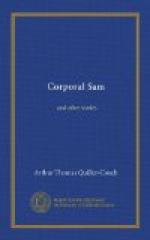Nevertheless, and hate it though he might, our pay was in arrears. Moreover, apart from their fatigue of marching and counter-marching, the bulk of our infantry had been drawn from the London train-bands— the Red Westminster Regiment and the Auxiliaries, Green and Yellow, of London City and the Tower Hamlets; tradesmen, that is to say, who wearied to be home again with their wives and families after six months’ separation, and others (such as the White Regiment of Auxiliaries) freshly drafted, that had scarce got over the remembrance of parting. These regiments, too, comprised many score of apprentices, whom Parliament allowed to count their time of military service as though it had been spent with their masters: and as apprentice and master marched side by side, and it often fell that the youngster won promotion, with leave to order his elder about, you may guess there were heart-burnings. Add to this that it kept these good citizens chafing to note how often (and indeed regularly) advancement passed them over to light on some young gentleman of family or ‘imp,’ as they growled, ‘from the Inns of Court.’
We lay—in horse and foot some five thousand strong—well centred in and about the town and castle of Farnham, with a clear road to London behind us and in front a nearly equal enemy planted across our passage to the West. You may take a map with ruler and pencil and draw a line through from Winchester to Oxford, where the King kept his Court. On the base of it, at Winchester, rested General Hopton’s main force. North and east of it, at Alton, my Lord Crawford stood athwart the road with sufficient cavalry and Colonel Bolle’s regiment of foot; yet farther north, Basing House, with my Lord of Winchester’s garrison, blocked the upper path for us; and yet beyond, Sir Edward Ford’s regiment held the passes of the hills toward Oxford; so that for the while, and in face of us, messengers, troops, even artillery, might pass to and fro without challenge. This line of defence, though it forestalled us on every road, was weak in that it drew out Hopton’s strength and attenuated it at too great distances. This our general perceived, and nursed himself for a sudden blow.
Now I must mention that with the entry of December there fell the beginning of a cruel frost, that lasted six weeks and was enough to make this winter memorable without help of wars or bloodshed. At the first we all hailed it, as hardening the roads, which for a month had been nigh impassable: and either commander took speedy advantage of it—Hopton to make a swift diversion into Sussex and capture Arundel Castle (which was but a by-blow, for in a few weeks he had lost it again), and our own general to post up with his short, quick legs to London, where in two days he had wrung from Essex good reinforcements, with promise of pay for the troops and a consignment of leathern guns—a new invention and extremely portable. By the evening of December 5th he was back among us and despatching us north, south, and east to keep the enemy jumping while our supplies drew in.




